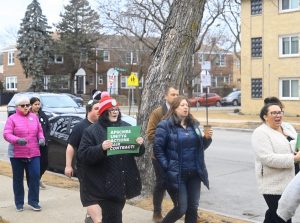An update on the DACA program
February 13, 2018
President Donald Trump was very critical of the Deferred Action for Childhood Arrivals program in the past months and coming March 5, 2018, DACA will officially be deceased as a program.
This has millions of DACA recipients worried and without a clue on what to do after March 5.
Democrats and Republicans in Congress are trying to find a solution before the deadline. With this deadline looming, a lot of people still bare the question of what might happen with the DACA recipients after March 5.
Former President Barack Obama established this program back in 2012 to help give people a chance to pursue citizenship and a better life.
Some institutions gave benefits, as protection from deportation, to DACA recipients and one of those institutions is the U.S. Military.
An article by CBS News stated: “Anyone who has enlisted in the military and is waiting to report to boot camp, on active duty or in the active reserves or anyone with an honorable discharge will not be deported. Two exceptions for that would be for anyone who has committed a serious felony or is the subject of a deportation order.”
The military is one of the institutions that will protect DACA recipients, but only from selected countries such as European, African and Asian countries and they must follow the Military Accessions Vital To National Interest (MAVINA) recruitment program. More on MANIVA can be found at the following link: https://www.defense.gov/news/mavni-fact-sheet.pdf
The big question is how schools can protect undocumented students
An example of such a school is NEIU.
The Assistant Dean and Director of Undocumented Student Resources, Luvia Moreno, talked about the issues surrounding DACA and the different programs that can help undocumented students on campus.
Moreno said, “If you currently have DACA and you have a work permit for two years, you are protected under DACA for those next two years, regardless of the March 5 deadline. You still have those two years protected from deportation and to be able to continue working.”
She continues, “There are some scholarships that were created once DACA started. They were created specifically for DACA students, but some of those organizations that created these scholarships are now being a little more open minded and say if DACA is going to end, we will still want to help undocumented students out.”
This idea captures the way a lot of groups are helping out in the fight for DACA.
Moreno mentioned the club Undocumented, Resilient and Organize (URO), which helps undocumented students on campus.
The government has less than a month to reach a deal on DACA.
Students can reach out to Luvia Moreno with further questions at Lu-Moreno@neiu.edu, or reach out to URO for more resources.









